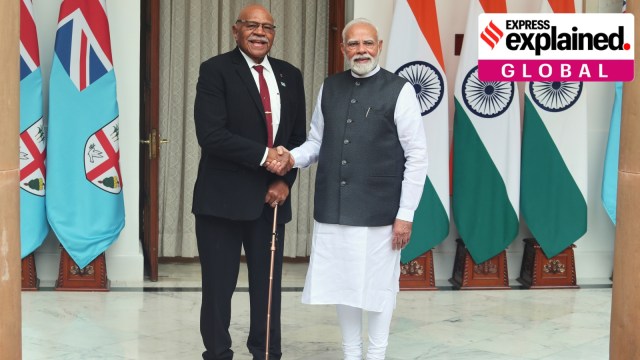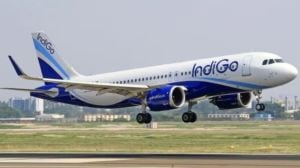Fiji PM Sitiveni Rabuka’s complicated relationship with country’s Indian diaspora
Rabuka met Prime Minister Narendra Modi in New Delhi on Monday
 Prime Minister Narendra Modi (right) with his Fijian counterpart Sitiveni Ligamamada Rabuka in New Delhi, Monday, Aug. 25, 2025. (AP Photo/Pankaj Nangia)
Prime Minister Narendra Modi (right) with his Fijian counterpart Sitiveni Ligamamada Rabuka in New Delhi, Monday, Aug. 25, 2025. (AP Photo/Pankaj Nangia)Prime Minister Narendra Modi met his Fijian counterpart Sitiveni Ligamamada Rabuka in Hyderabad House, New Delhi on Monday (August 25). Rabuka is in India for a three-day trip, his first to the country since becoming Prime Minister in December 2022.
Fiji has a sizable Indian diaspora. Speaking about the Fijian-Indians, Rabuka said: “They have contributed to what Fiji is today…They continue to contribute to Fiji’s growth, to Fiji’s economy, to Fiji’s stability”.
But Rabuka’s rise in Fijian politics came on the back of his role in the coup of 1987 which removed the first ethnic India Prime Minister of the country from office. He has since apologised for his actions, most notably in 2023. Here’s the story.
Coup of 1987
On the morning of May 14, 1987, Rabuka, then a lieutenant colonel in the army, and 10 masked soldiers, stormed Fiji’s parliament and arrested Prime Minister Timoci Bavadra. At a news conference subsequently, Rabuka announced the suspension of the constitution and said he would form a caretaker government until fresh elections are held to “restore civilian rule and go back to democracy”, The Indian Express had reported at the time.
The coup took place a little over a month after an alliance of the National Federation Party and Labour Party won elections that led to the formation of a cabinet dominated by ethnic Indians for the first time since Fiji’s independence from Britain in 1970. Bavadra was the first Fijian-Indian to lead the country.
 Paper cutting of The Indian Express from May 15, 1987.
Paper cutting of The Indian Express from May 15, 1987.
A day after his takeover, Rabuka announced he was drafting a new constitution that would guarantee Fiji would never again have an Indian-dominated government (‘No Power for Indians: Rabuka’, The Indian Express, May 16, 1987). He denied discriminating against Indians, and claimed that he was only “looking after the Fijians’ interest”.
On May 19, anti-Indian riots broke out in the country. “[A] crowd of ethnic Fijians ran through the streets of Suva in an hour-long rampage, attacking Indians and Indian-owned shops” despite Rabuka’s appeals for calm, The Indian Express reported on May 20. At least 50 Indians were reported injured in the violence that was provoked by a rally that Indians took out in support of the ousted Prime Minister.
Rabuka’s second coup
Widespread racial violence followed the military takeover, wrote academic Dr Amba Pande in an article published in the journal Strategic Analysis (Race and Power Struggle in Fiji). Pande wrote that an attempt by the governor-general to form an advisory council with both Bavadra and Rabuka failed after the ousted Prime Minister refused to participate “on the grounds that the composition of the council was unconstitutional and biased”.
Following weeks of negotiations, in July 1987, plans to reform the constitution were approved, and it was decided that Bavadra and Kamisese Mara — a former Prime Minister popular with indigenous Fijians — would form an interim government.
In response, Rabuka orchestrated a second coup on September 25 of that year. He declared Fiji a republic, and proclaimed himself head of the state, replacing the Queen. Countries around the world condemned these actions and refused to recognise his regime, and India imposed trade sanctions on Fiji.
Under pressure, Rabuka resigned as head of state on December 6, 1987, and Penaia Ganilau became the first President of the Fijian republic. A new constitution was promulgated in 1990, and elections were held two years later.
Background of crisis
The election victory of the Indo-Fijians was only a trigger for Rabuka’s coup. Since independence, the South Pacific Ocean archipelago had been seeing a widening political divide between ethnic Indians and indigenous Fijians.
Indians were brought to Fiji from 1879 onward as “girmitiyas” or indentured labour transported to work in sugar plantations. The majority of these Indians stay back after the indenture system ended and, over time, gained prosperity. The Indian community eventually became the backbone of Fiji’s economic system, and they had, by the 1940s, outnumbered ethnic Fijians in the islands’ population.
Another reason for the Fijians’ resentment was the nature of landholdings. Indigenous Fijians owned more than 83% of the land on the islands, but Indian tenant farmers held most of it on 99-year leases, according to Pande’s article. “Despite the fact that the land was legally made inalienable by the constitution of 1970, the fear of losing it had always been there in the minds of the Fijians,” Pande wrote.
All these insecurities came to a boil after the general elections of 1987, and a section of indigenous Fijians sought to thwart Indo-Fijians from getting political power. Rabuka’s two coups triggered a massive wave of emigration — according to a report published by The Guardian in 2000, around 70,000 Indians fled the country to “escape the oppression”.
Multiple apologies
Over the years, Rabuka has multiple times apologised for the coup of 1987.
He had apologised publicly on the 21st anniversary of the takeover in 2008. “It was a mistake and I admit I was wrong…Staging a coup is something no one should be proud of because you don’t become a hero, so all the copycats should not think they will be heroes,” he said on that occasion, according to a Reuters report.
Then in 2023, months after being elected Prime Minister for the second time, Rabuka apologised again.
“I make this confession on my own behalf and on behalf of all those who took part with me in the military coup on the 14th of May, 1987. We confess our wrongdoings, and we confess that we have hurt so many of our people in Fiji, particularly those of the Indo-Fijian community of the time and among them sons, daughters, grandsons and granddaughters of those who were indentured as labourers from India between 1879 and 1916,” Rabuka said in the country’s capital, Suva.
Over the years, the strained relationship between native Fijians and ethnic Indians has dominated Fiji’s politics. Fijian-Indians have borne the brunt of repression by the state and native Fijians, and there have been multiple coups (another one notably in 2000) to oust Indian-led leadership.
In recent years, however, there have been concerted efforts to move past old grievances. In December 2023, Rabuka, Deputy PM Biman Prasad, Fiji Methodist Church President Reverend Ili Vunisuwai, Former PM and Leader of Fiji Labour Party Mahendra Chaudhry, and other religious organisation leaders signed the ‘Forward Fiji Declaration’ to usher in a new era of understanding between the indigenous and Indo-Fijian people.
This is an updated version of an article first published in 2023
- 01
- 02
- 03
- 04
- 05






































